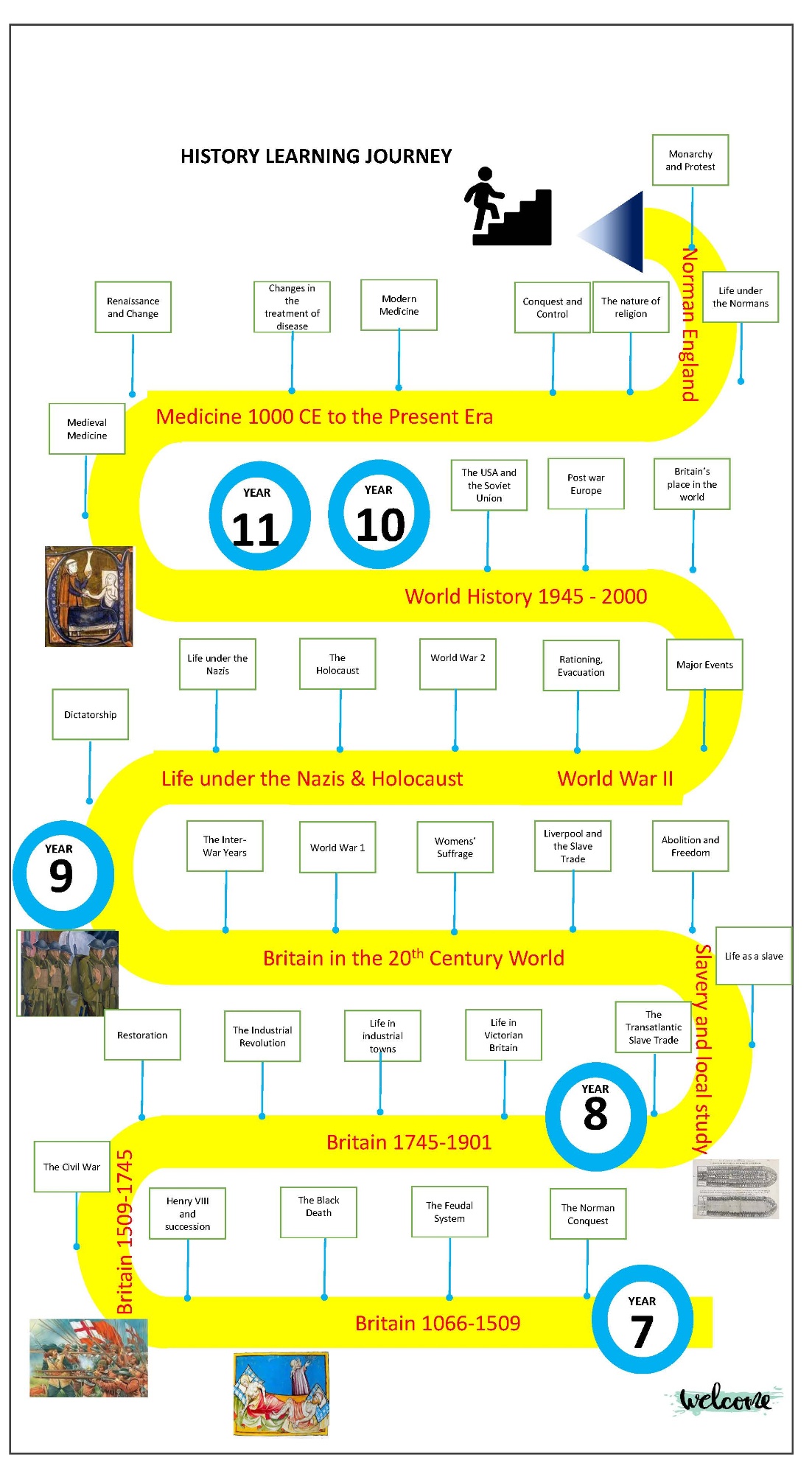History

Subject Leader: Mr Dowds
Primary Lead: Mr Quayle
Overview
History allows pupils show their understanding of what they have learned by making connections and drawing contrasts between different periods and areas studied, and by using their historical knowledge to analyse the past and explain how it can be represented and interpreted in different ways.
They should also learn how different types of historical sources are used to make claims about the past. Students learn and develop the key concept skills of the historian while studying and exploring a variety of engaging time periods through a defined process of enquiry.
Key Stage 1
At West Kirby School and College the teaching and learning of history is based upon discussion, use of primary and secondary sources, debate, role play, field work and first hand experiences. The children will often work in mixed ability groups, however differentiation is identified and provided and therefore activities and groupings will vary. Each year group has their own set of resources, specifically designed for the unit of study they are undertaking. The Library and Internet will also provide further source materials and information.
History is taught in a cross curricular way through our 'Learning Means the World' curriculum.
Key Stage 2
The intent of history in Key Stage 2 is to stimulate the child’s interest and understanding about the life of people. We help pupils gain knowledge of Britain’s past, and that of the wider world. We teach children a sense of chronology, and through this, they develop a sense of identity and a cultural understanding based on their historical heritage. Therefore, they learn to value their own and other people’s cultures in modern, multicultural Britain.
By considering how people lived in the past, they are better able to make their own life choices today. In our school, History makes a significant contribution to citizenship education by teaching how Britain developed as a democratic society. We teach children to understand how events in the past have influenced our lives today; we also teach them to investigate these past events and by doing so, develop the skills of enquiry, analysis, interpretation and problem solving.
Key Stage 3
In Key Stage 3, student’s overview skills such as source analysis, interpretation, understanding significance and the constantly intertwining relationship between change and continuity. These skills are then steadily embedded into chronologically ordered themes that explore the significance of turning points in the social and cultural evolution of the British Isles, with events such as when and how did the Normans conquer England? Was the Black Death really a disaster? How has history interpreted the significance of the Tudor dynasty?
Understanding of each topic is consolidated via a combination of assessed oral and written work in which students are actively encouraged to self-evaluate their own comprehension of each topic area and, with guidance, provide a platform at each assessment on which to continually build their skills.
Key Stage 4
At Key Stage 4 students have the opportunity to take GCSE history as an Option.
GCSE History
GCSE specifications in History support students in learning more about the history of Britain and that of the wider world. The study of history at GCSE will inspire students to deepen their understanding of the people, periods and events studied and enable them to think critically, weigh evidence, sift arguments, make informed decisions, and develop perspective and judgement. This, in turn, will prepare them for a role as informed, thoughtful and active citizens.
GCSE specifications in history will enable students to:
- Develop and extend their knowledge and understanding of: specified key events
- Learn about periods and societies in the history of their locality, Britain, and the wider world; and of the wide diversity of human experience
- Engage in historical enquiry to develop as independent learners and as critical and
- Become reflective thinkers
- Develop the ability to ask relevant questions about the past, to investigate issues
- Think critically and to make valid historical claims by using a range of sources in their historical context
- Develop an awareness of how and why different interpretations have been constructed about people, events and developments from the past and why they may have been accorded significance
- Organise and communicate their historical knowledge and understanding in different ways and reach substantiated conclusions
- Recognise that the discipline of history and a knowledge and understanding of the past helps them to understand their own identity and significant aspects of the world in which they live, and provides them with the basis for further wider learning and study
AQA GCSE 8145
History syllabus
Paper 1 – Understanding the Modern World:
AB – Germany 1890-1945 Democracy and Dictatorship
BB – Conflict and Tension – The Inter War Years 1918-1939
Paper 2 - Shaping the Nation:
AA – Britain, Health and the People c1000 – present day
BA – Norman England c1066-1000
